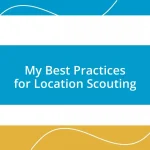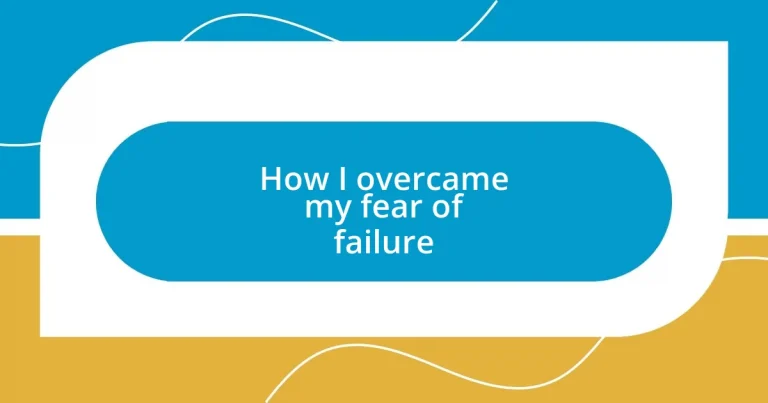Key takeaways:
- Fear of failure can motivate personal growth and resilience when reframed as an opportunity rather than a setback.
- Identifying personal triggers, such as negative self-talk and external expectations, helps manage anxiety and fear.
- Building a supportive network fosters accountability, boosts confidence, and provides encouragement during challenges.
- Celebrating small wins reinforces progress and cultivates resilience, transforming setbacks into learning experiences.
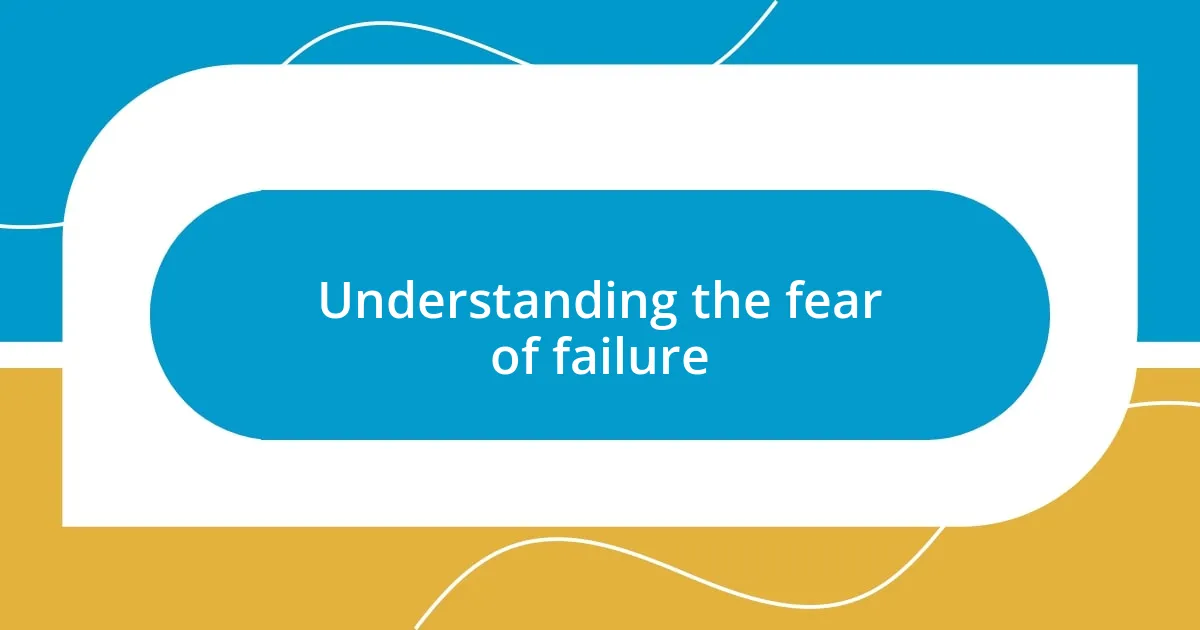
Understanding the fear of failure
Fear of failure is a deeply ingrained emotion that often stems from our desire for perfection. I remember vividly the first time I stood up to present in front of my class. My heart raced as I worried about stumbling over my words or being judged. Have you ever felt that weight of expectation pressing down on you?
This fear can be paralyzing, creating mental blocks that prevent us from taking risks. I once let an incredible job opportunity slip away because I was terrified of not meeting expectations. It made me realize that avoiding failure often holds us back more than failure itself ever could.
Interestingly, the fear of failure isn’t purely negative; it can serve as a powerful motivator. After my missed opportunity, I asked myself—what’s worse, failing or never trying at all? That question ignited a spark in me, pushing me to embrace challenges rather than shy away from them.
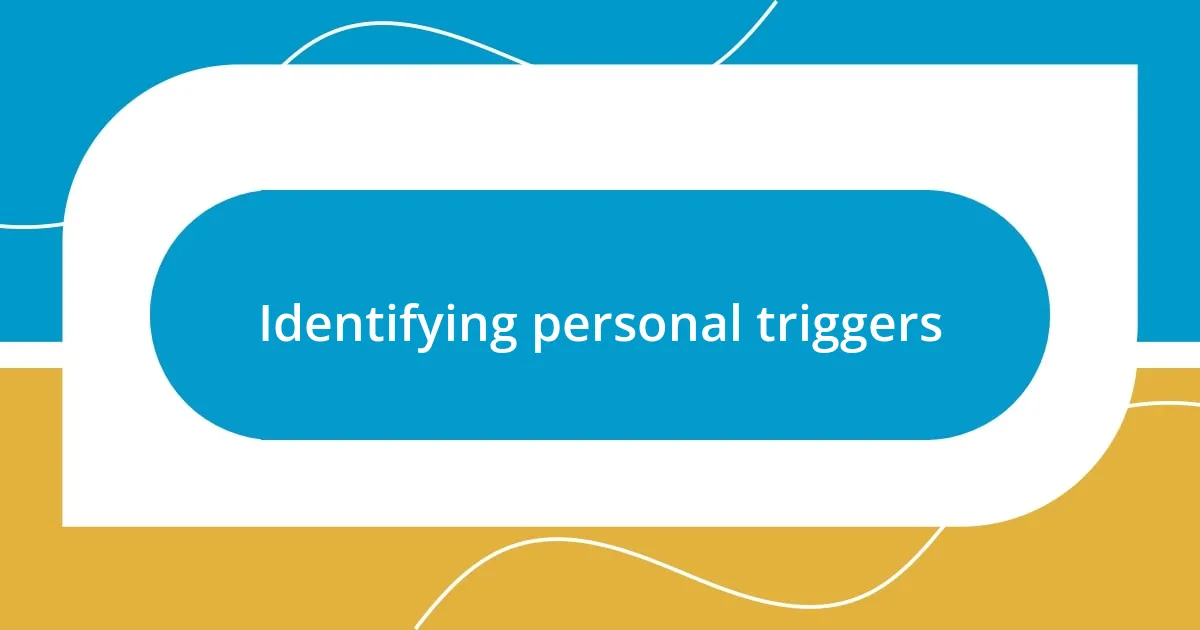
Identifying personal triggers
Identifying personal triggers is a crucial step in overcoming the fear of failure. I’ve found that specific situations tend to ramp up my anxiety, such as high-stakes meetings or public speaking events. By recognizing these triggers, I can better prepare myself emotionally and mentally.
To help illuminate your own triggers, consider the following points:
- Negative Self-Talk: Pay attention to the thoughts that run through your mind when faced with a challenge. I used to spiral into self-doubt, questioning my abilities and worthiness.
- Perfectionism: Does the idea of not achieving perfection make you hesitate? I noticed I often set unrealistically high standards for myself, which only intensified my fear.
- Comparison to Others: Reflect on how you feel when comparing your achievements to those of others. I’ve caught myself feeling inadequate when watching peers excel, which would trigger my fear.
- Past Experiences: Examine any past failures that still haunt you. For me, an embarrassing moment from my past would often resurface, stirring up anxiety about similar situations.
- External Expectations: Consider the pressure you feel from others. When I sense heightened expectations, I often freeze up, fearing I’ll let someone down.
Recognizing these triggers can transform the way you handle fear, turning it into something manageable rather than paralyzing.
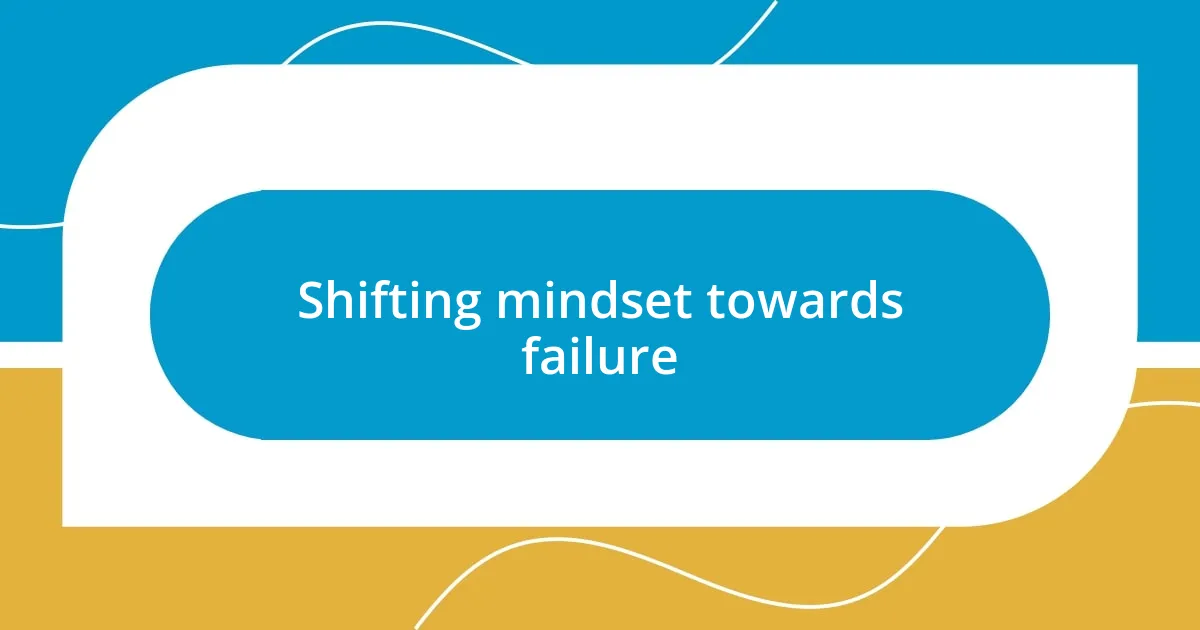
Shifting mindset towards failure
Shifting your mindset towards failure involves reframing how you perceive challenges. I recall a moment when I nervously prepared for a critical presentation. Instead of fixating on the potential for failure, I decided to view it as an opportunity for growth. This simple shift allowed me to approach the experience with curiosity rather than dread.
Adopting a growth mindset can be a game-changer. I used to see setbacks as definitive proof of my shortcomings, but now I understand that they are stepping stones to success. For instance, after a disappointing project, I took a step back and analyzed what went wrong. Instead of feeling defeated, I felt empowered to learn from my mistakes and apply those lessons moving forward.
Finally, embracing vulnerability plays a pivotal role in overcoming the fear of failure. Initially, I struggled to share my thoughts for fear of being judged. However, when I allowed myself to be open about my fears, I found that others resonated with my experiences. It created a sense of community and support, which ultimately made me more resilient in the face of challenges.
| Fixed Mindset | Growth Mindset |
|---|---|
| Sees failure as a reflection of self-worth | Views failure as a learning opportunity |
| Avoids challenges to prevent failure | Embraces challenges for personal development |
| Feels threatened by others’ success | Finds inspiration in others’ achievements |
| Gives up easily | Persistently seeks improvement |
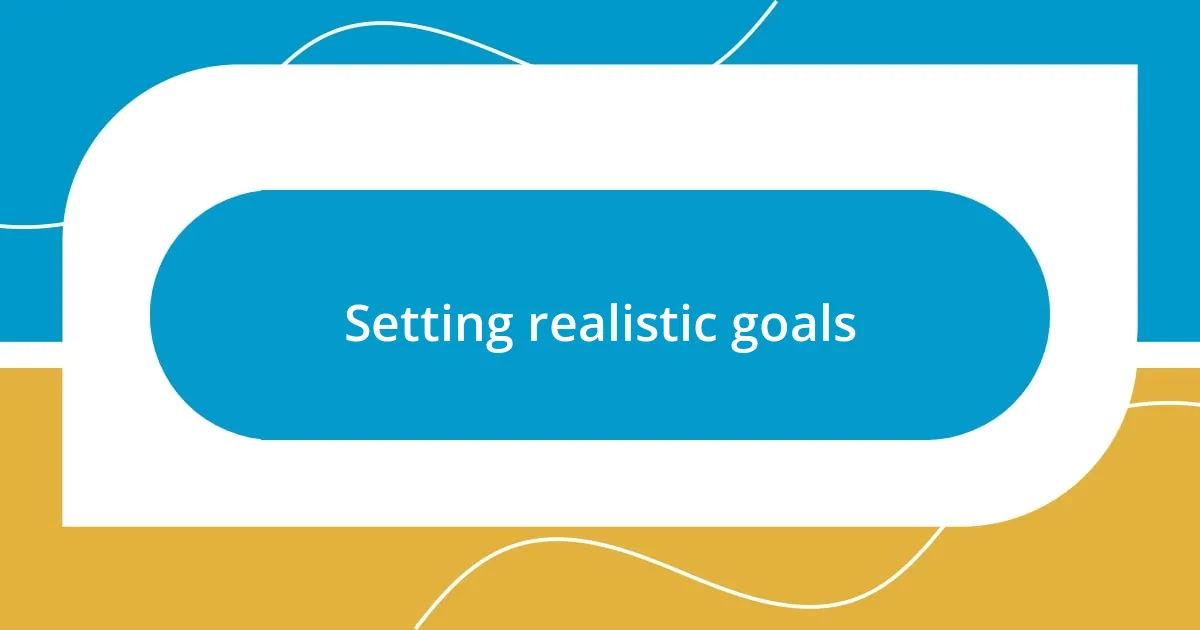
Setting realistic goals
Setting realistic goals has been pivotal in my journey to overcome my fear of failure. I remember the first time I tried to tackle a big project without breaking it into manageable tasks. I felt overwhelmed and anxious, which nearly paralyzed me. After that experience, I learned the importance of setting smaller, achievable milestones. This approach allows me to celebrate small victories, boosting my confidence along the way.
When I set goals, I always ask myself, “Is this attainable? Am I pushing myself too hard?” One time, I aimed to complete a comprehensive book in a week, only to feel defeated when I couldn’t keep up. It taught me to define my objectives realistically. Now, I break such tasks into daily reading goals, making the process feel less daunting while still keeping my passion alive.
I also find it essential to regularly revisit and adjust my goals as needed. Life happens, and sometimes my original plans become unrealistic due to unforeseen circumstances. For instance, during a particularly busy work period, I modified my goals to accommodate my schedule. This flexibility has helped me maintain motivation and stay focused without losing sight of what I want to achieve. Does the idea of adjusting your goals sound helpful? I can confidently say that it has made a significant difference for me.
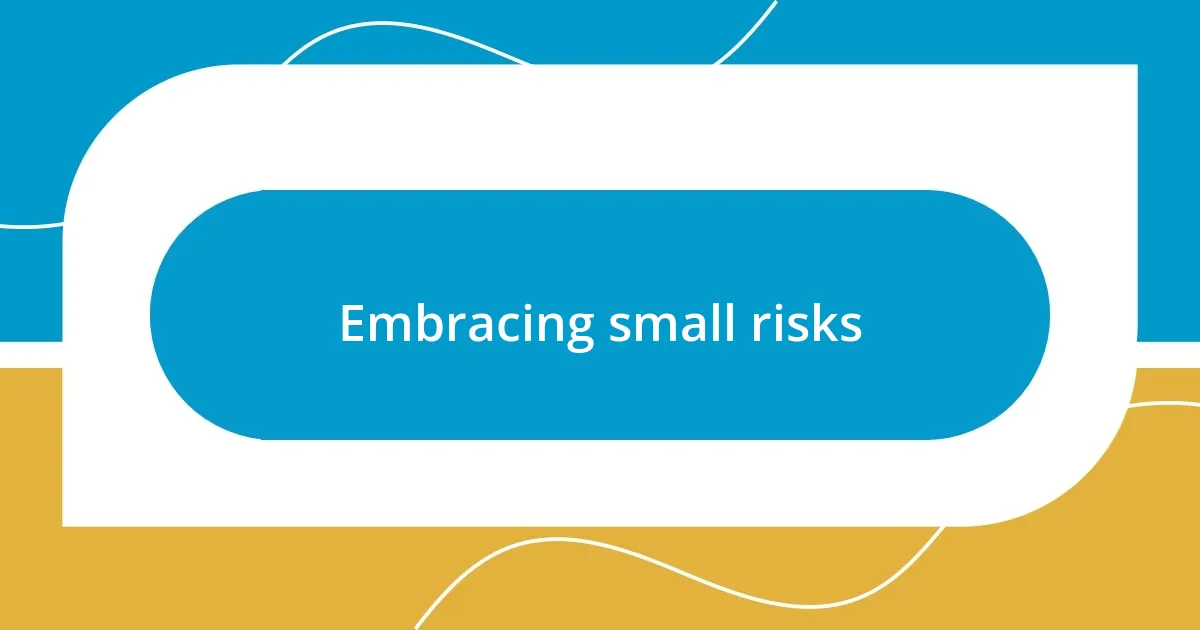
Embracing small risks
Embracing small risks has been transformative for me. I vividly remember the first time I decided to speak up in a meeting when I usually stayed silent. My heart raced, but sharing my idea—even though it was just a small contribution—felt liberating. The supportive reactions from my colleagues encouraged me to take more of these small leaps, each one building my confidence.
One day, I decided to sign up for a local art class, despite believing I had no artistic talent. I approached the class with trepidation, wondering what others would think if I didn’t excel. However, I discovered that the joy of creation outweighed my fear of judgment. I found myself taking more creative liberties, even if it meant making mistakes along the way. This experience taught me that taking small, calculated risks can lead to delightful surprises and personal growth.
Have you ever felt hesitant to try something new? I’ve realized that embracing those small risks prepares me for bigger challenges. For instance, when I volunteered to lead a small project at work, the fear of failing loomed large. But I reminded myself of my past successes, no matter how minor, and took the plunge. Each small risk I take not only diminishes my fear of failure but also adds layers to my self-confidence, opening up a world of possibilities I never thought possible.
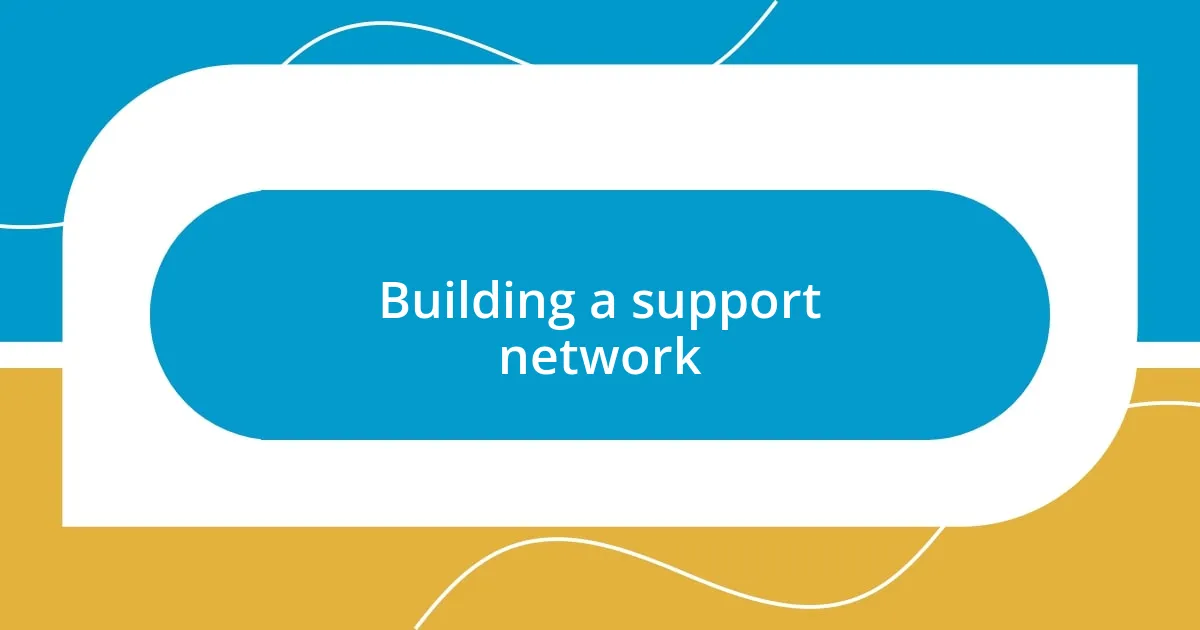
Building a support network
Building a support network has been one of the cornerstones of my journey in overcoming my fear of failure. I remember a time when I faced a daunting deadline at work and felt completely alone in my struggle. Reaching out to a close colleague for advice not only eased my anxiety, but their encouragement and shared experiences made me realize how vital it is to have a network of supportive individuals around you. Have you ever felt isolated in your fears? I know that a simple conversation can offer a fresh perspective and remind us we’re not alone.
I’ve also found that surrounding myself with people who uplift me fosters a sense of accountability and motivation. For instance, I joined a local writing group where we share our work and provide constructive feedback. The first time I submitted a piece, my heart raced, worrying about the reactions. However, the support I received inspired me to keep expressing my thoughts without the crippling fear of harsh criticism. That nurturing environment highlighted the power of community; it transformed doubt into encouragement. Don’t you think this supportive feedback can propel us toward greater accomplishments?
Additionally, I’ve learned that building a support network isn’t just about receiving; it’s also about giving back. I realized how rewarding it is when I can lend an ear or share advice with someone who is struggling. I recall a friend who was paralyzed by her own insecurities about starting a new project. By offering my encouragement and sharing my own fears, we both benefited from the exchange. It’s incredibly validating to uplift others while processing your own journey. So, how can you start cultivating this sense of community in your life? Perhaps by reaching out to a friend or joining a group that resonates with you. You’ll likely discover the profound impact it can have on your confidence and growth.
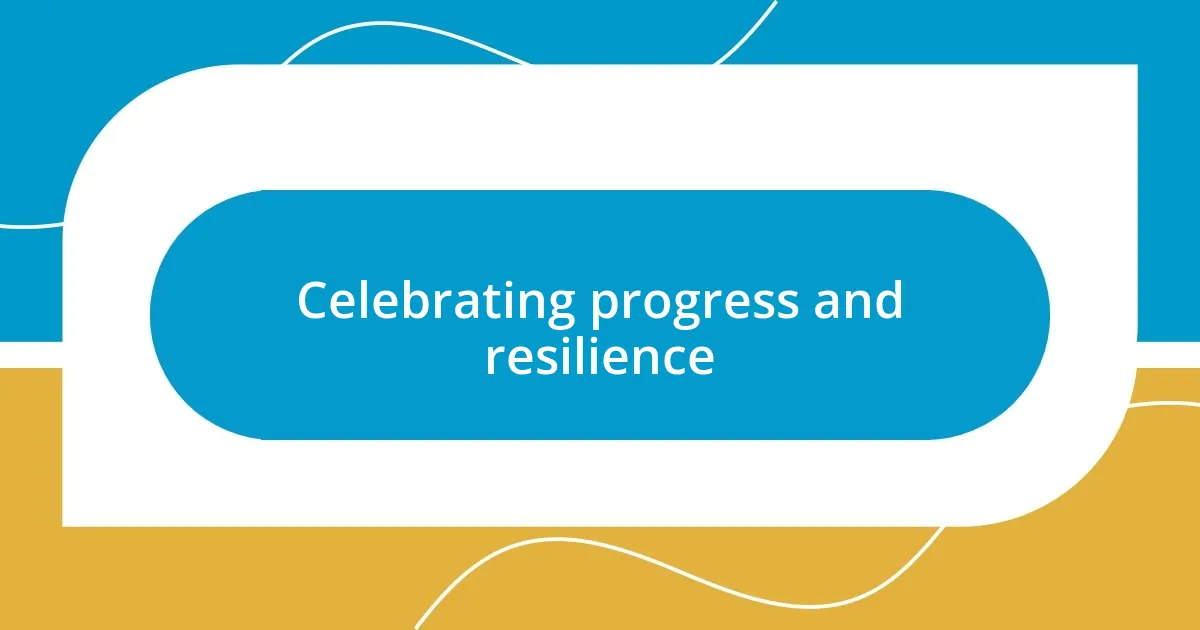
Celebrating progress and resilience
Finding joy in progress, no matter how small, has been a pivotal part of my growth. I still remember the day I finally submitted an article I had been putting off because of my fear of judgment. As soon as I hit “send,” a wave of relief washed over me. It was a simple step, but celebrating that victory—no matter how small—helped me recognize that each effort matters.
Resilience often shines through our ability to acknowledge our progress. There was a time when the fear of failing in my fitness journey held me back. I started with just a few minutes of jogging around my block, feeling like a novice. To my surprise, each time I completed that route, I felt a sense of achievement that outweighed any discomfort. Isn’t it amazing how these small wins can fuel our spirit and motivate us to keep pushing forward?
I’ve also learned to embrace setbacks as stepping stones rather than roadblocks. One memorable moment was when I stumbled during a public speaking event. Instead of spiraling into embarrassment, I chose to laugh it off. That moment of vulnerability turned into an opportunity for connection, as others shared their own stories of stumbling in similar situations. Doesn’t it feel reassuring to realize that progress isn’t just about perfection, but about the resilience we cultivate along the way?










